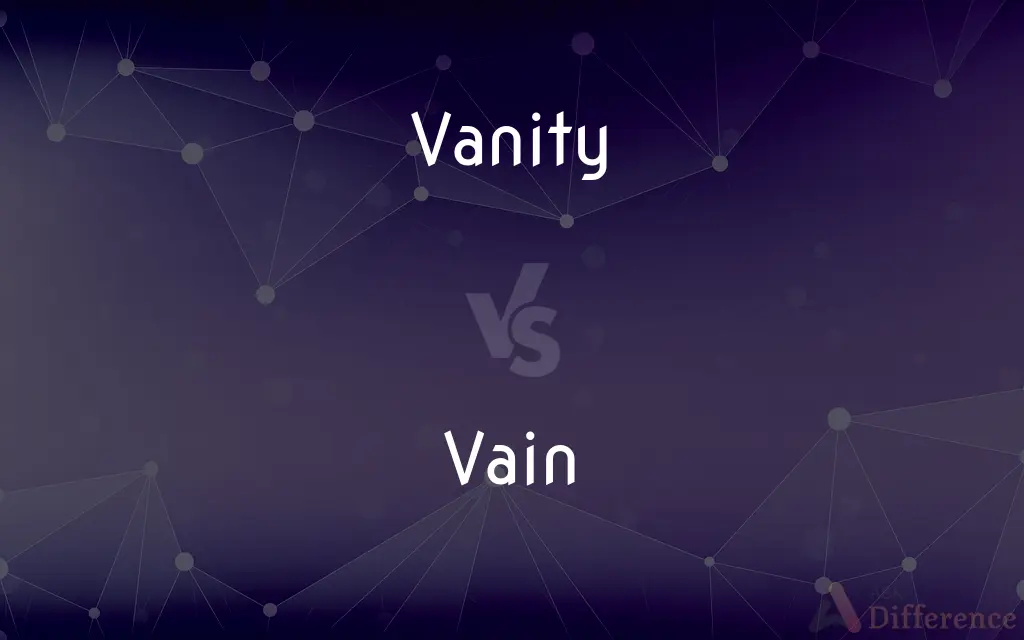Vanity vs. Vain — What's the Difference?
Edited by Tayyaba Rehman — By Fiza Rafique — Updated on March 10, 2024
Vanity involves excessive pride in one's appearance or achievements, whereas vain describes someone with such pride. Both entail self-admiration but differ in use.

Difference Between Vanity and Vain
Table of Contents
ADVERTISEMENT
Key Differences
Vanity is often characterized by an obsession with one’s appearance or achievements, suggesting a deeper preoccupation with self-image. This can manifest in spending excessive time or resources on looks or accolades, driven by the desire for admiration or validation from others. On the other hand, describing someone as vain highlights their excessive pride or self-admiration, focusing more on the attitude or behavior of individuals rather than the act itself.
While vanity can be seen as a trait or condition, often leading to tangible actions or behaviors aimed at enhancing one’s self-perception, being vain is an adjective that directly describes a person’s character. It implies a superficiality and egocentricity that may not always lead to action but permeates a person's demeanor or attitude.
Vanity is sometimes considered in a broader societal or cultural context, reflecting collective behaviors or trends driven by superficial values. In contrast, calling someone vain is typically a personal observation, emphasizing an individual’s self-absorption without necessarily indicting a wider social phenomenon.
In literary and philosophical discussions, vanity often conveys a sense of futility or emptiness associated with excessive self-concern, suggesting that such preoccupations are ultimately unfulfilling. Vain, however, is used more to describe the futility of actions or efforts that fail to achieve their intended outcome, extending beyond personal pride to encompass ineffectual endeavors.
The term vanity can also refer to physical objects, such as a vanity table, which are associated with the act of beautification or self-adornment. This connection underscores the material aspect of vanity, linking it to physical manifestations of self-focus. Vain does not have a similar material application, as it strictly describes an intangible quality or characteristic of a person.
ADVERTISEMENT
Comparison Chart
Definition
Excessive pride in one's appearance or achievements
Having or showing an excessively high opinion of one's appearance, abilities, or worth
Nature
Noun
Adjective
Context
Often associated with actions or behaviors
Describes a person's character or attitude
Usage
Can describe both a trait and physical objects related to self-adornment
Used to describe a person’s demeanor or the futility of actions
Implication
Suggests a preoccupation with superficial values
Implies egocentricity and superficiality
Compare with Definitions
Vanity
Reflects a societal condition.
Modern society's vanity is mirrored in its celebrity culture.
Vain
Describes the inefficacy of actions.
All attempts to reconcile were in vain.
Vanity
Excessive interest in one's own appearance or achievements.
Her vanity is evident in her extensive collection of beauty products.
Vain
Having an excessively high opinion of oneself.
He is too vain to admit when he's wrong.
Vanity
Concerned with external validation.
Vanity drives her to seek constant praise on social media.
Vain
Focused on superficial qualities.
She's vain about her looks but neglects her character.
Vanity
Often linked to materialism.
The vanity table was cluttered with luxury cosmetics.
Vain
Characterized by futility.
Their efforts to impress were vain.
Vanity
A trait leading to obsessive self-focus.
His vanity prevents him from acknowledging his faults.
Vain
Reflects an attitude of egocentrism.
His vain personality makes him unpopular.
Vanity
The trait of being vain and conceited
Vain
Having or showing an excessively high opinion of one's appearance, abilities, or worth
A vain woman with a streak of snobbery
Their flattery made him vain
Vanity
Vanity is the excessive belief in one's own abilities or attractiveness to others. Prior to the 14th century it did not have such narcissistic undertones, and merely meant futility.
Vain
Producing no result; useless
A vain attempt to tidy up the room
The vain hope of finding work
Vanity
Excessive pride in or admiration of one's own appearance or achievements
The vanities and ambitions of politicians
It flattered his vanity to think I was in love with him
Vain
Not yielding the desired outcome; fruitless
A vain attempt.
Vanity
The quality of being worthless or futile
The vanity of human wishes
Vain
Lacking substance or worth
Vain talk.
Vanity
A dressing table.
Vain
Having or showing excessive pride in one's appearance or accomplishments; conceited.
Vanity
Excessive pride in one's appearance or accomplishments; conceit.
Vain
(Archaic) Foolish.
Vanity
Something about which one is vain or conceited
"One thing ... rather quenched her vanities.
Vain
Overly proud of oneself, especially concerning appearance; having a high opinion of one's own accomplishments with slight reason.
Vanity
Worthlessness, pointlessness, or futility
The vanity of regretting missed opportunities.
Vain
Having no real substance, value, or importance; empty; void; worthless; unsatisfying.
Vanity
Something that is vain, futile, or worthless.
Vain
Effecting no purpose; pointless, futile.
Vain toil
A vain attempt
Vanity
See vanity case.
Vain
Showy; ostentatious.
Vanity
See dressing table.
Vain
Having no real substance, value, or importance; empty; void; worthless; unsatisfying.
Every man walketh in a vain show.
Let no man deceive you with vain words.
Vain pomp, and glory of this world, I hate ye!
Vain wisdom all, and false philosophy.
Vanity
A bathroom cabinet that encloses a basin and its water lines and drain, usually furnished with shelves and drawers underneath for storage of toiletries.
Vain
Destitute of force or efficacy; effecting no purpose; fruitless; ineffectual; as, vain toil; a vain attempt.
Bring no more vain oblations.
Vain is the force of manTo crush the pillars which the pile sustain.
Vanity
That which is vain, futile, or worthless; that which is of no value, use or profit.
Vain
Proud of petty things, or of trifling attainments; having a high opinion of one's own accomplishments with slight reason; conceited; puffed up; inflated.
But wilt thou know, O vain man, that faith apart from works is barren?
The minstrels played on every side,Vain of their art.
Vanity
Excessive pride in or admiration of one's own abilities, appearance, achievements, or possessions.
Vain
Showy; ostentatious.
Load some vain church with old theatric state.
Vanity
A dressing table used to apply makeup, preen, and coif hair. The table is normally quite low and similar to a desk, with drawers and one or more mirrors on top. Either a chair or bench is used to sit upon.
Vain
Vanity; emptiness; - now used only in the phrase in vain.
Vanity
A washbasin installed into a permanently fixed storage unit, used as an item of bathroom furniture.
Vain
Characteristic of false pride; having an exaggerated sense of self-importance;
A conceited fool
An attitude of self-conceited arrogance
An egotistical disregard of others
So swollen by victory that he was unfit for normal duty
Growing ever more swollen-headed and arbitrary
Vain about her clothes
Vanity
Emptiness. en
Vain
Unproductive of success;
A fruitless search
Futile years after her artistic peak
A sleeveless errand
A vain attempt
Vanity
(obsolete) Any idea, theory or statement that is without foundation.
It is a vanity to say that if two stones are dropped from a tower, the heavier will experience the greater acceleration.
Vanity
The quality or state of being vain; want of substance to satisfy desire; emptiness; unsubstantialness; unrealness; falsity.
Vanity of vanities, saith the Preacher, vanity of vanities; all is vanity.
Here I may well show the vanity of that which is reported in the story of Walsingham.
Vanity
An inflation of mind upon slight grounds; empty pride inspired by an overweening conceit of one's personal attainments or decorations; an excessive desire for notice or approval; pride; ostentation; conceit.
The exquisitely sensitive vanity of Garrick was galled.
Vanity
Same as dressing table.
Vanity
A cabinet built around a bathroom sink, usually with a countertop and sometimes drawers.
Vanity
Feelings of excessive pride
Vanity
The quality of being valueless or futile;
He rejected the vanities of the world
Vanity
Low table with mirror or mirrors where one sits while dressing or applying makeup
Common Curiosities
How do vanity and being vain differ in usage?
Vanity is a noun describing a concept or trait, while vain is an adjective used to describe a person or the futility of actions.
What is vanity?
Vanity is the excessive pride in or preoccupation with one's own appearance or achievements.
Can vanity affect relationships?
Yes, vanity can strain relationships if one’s self-absorption or need for validation outweighs concern for others.
Is being vain always about appearance?
While often related to appearance, being vain can also refer to undue pride in one’s abilities or accomplishments.
Are vanity and pride the same?
Vanity and pride share similarities, but vanity emphasizes an excessive or unjustified level of pride, especially in superficial traits.
How does society view vanity?
Society often critiques vanity when it leads to excessive materialism or superficiality, yet paradoxically promotes self-focus through media and culture.
Can vanity be positive?
Generally, vanity is viewed negatively due to its focus on superficial values, but it can also reflect a healthy self-esteem when balanced.
What is a vanity table?
A vanity table is a piece of furniture designed for use in personal grooming, reflecting the material aspect of vanity.
Are there positive aspects of being vain?
While generally seen negatively, a certain level of concern for one's appearance or abilities can motivate self-improvement and confidence.
What does it mean to be vain?
Being vain means having an excessively high opinion of one's appearance, abilities, or worth.
Is it vain to wear makeup?
Wearing makeup isn’t inherently vain; it becomes vain when tied to an excessive preoccupation with appearance.
How can one overcome vanity?
Overcoming vanity involves fostering self-awareness, valuing inner qualities over external appearances, and prioritizing empathy for others.
Does vanity have a role in modern culture?
Vanity plays a significant role in modern culture, often fueled by social media and the emphasis on image and personal branding.
How is vanity depicted in literature?
In literature, vanity is often depicted as a flaw leading to downfall or as a critique of societal obsession with appearances and status.
How do vanity and humility interact?
Vanity and humility are often seen as opposites, with humility involving a more modest or realistic view of oneself compared to vanity’s excessive pride.
Share Your Discovery

Previous Comparison
Tacos vs. Nachos
Next Comparison
Ally vs. FoeAuthor Spotlight
Written by
Fiza RafiqueFiza Rafique is a skilled content writer at AskDifference.com, where she meticulously refines and enhances written pieces. Drawing from her vast editorial expertise, Fiza ensures clarity, accuracy, and precision in every article. Passionate about language, she continually seeks to elevate the quality of content for readers worldwide.
Edited by
Tayyaba RehmanTayyaba Rehman is a distinguished writer, currently serving as a primary contributor to askdifference.com. As a researcher in semantics and etymology, Tayyaba's passion for the complexity of languages and their distinctions has found a perfect home on the platform. Tayyaba delves into the intricacies of language, distinguishing between commonly confused words and phrases, thereby providing clarity for readers worldwide.















































